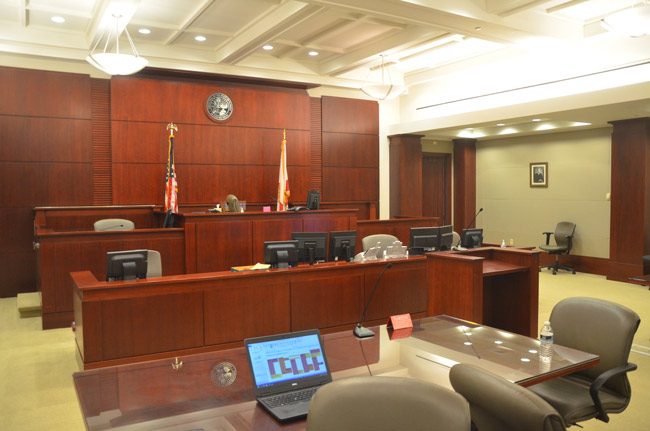
In a highly unusual move that heightened confusion in an already-murky legal arena, the Florida Supreme Court quickly rescinded an order Wednesday that would have barred prosecutors from seeking the death penalty in capital cases.
The release of the order — a mistake, according to a court spokesman — and its almost immediate retraction further muddled Florida’s embattled death penalty, on hold for nearly a year following a U.S. Supreme Court decision last January.
“The whole thing is bizarre,” House Judiciary Chairman Chris Sprowls, a Palm Harbor Republican and a former prosecutor, told The News Service of Florida in a telephone interview Wednesday.
Late Wednesday morning, the court released an order in the case of Larry Darnell Perry, one of a number of high-profile death penalty cases related to the U.S. Supreme Court ruling last January. That ruling found Florida’s capital sentencing system unconstitutional because it gave too much power to judges, instead of juries.
The Legislature quickly passed a new law intended to address the U.S. Supreme Court ruling. But the Florida Supreme Court struck down the new statute because it did not require unanimous jury recommendations for death to be imposed, something not addressed in the U.S. Supreme Court decision.
Wednesday’s order, vacated less than two hours after it was released by the court, would have denied Florida Attorney General Pam Bondi’s “request for clarification” in Perry’s case. In that case, the Florida court majority found that the new state law was unconstitutional because it required 10 of 12 jurors — rather than unanimous juries — to recommend the death penalty and that it “cannot be applied to pending prosecutions.”
The court vacated Wednesday’s order because it was released prematurely, according to spokesman Craig Waters.
“The order references cases that still are pending in the (Florida Supreme) Court in which separate opinions have not yet been issued. The error occurred because today’s order should not have been released until the opinions in those separate cases actually have been issued,” Waters said in a rare statement explaining the court’s action.
Appellate courts “routinely process” large numbers of cases at the same time and take steps to ensure that orders or opinions do not refer to cases that are pending, Waters wrote.
“The rule is that courts wait until all of the referenced opinions have been released to the public,” he wrote. “Due to purely human error, that process failed today. The Florida Supreme Court regrets the error and is reexamining its internal procedures to prevent similar errors from occurring in the future.”
In a dissent to the now-vacated opinion, Justice Ricky Polston referenced two death-penalty cases not yet decided by the court. Those cases focus on whether the new law could apply to cases already underway, if judges instruct juries that unanimous recommendations are required for the death penalty to be imposed.
Polston objected that the court should clarify its October ruling in Perry’s case, which he wrote “has created confusion and paralysis across the state regarding the death penalty and capital trials.”
Instead, the majority’s vacated order would have struck down the entire section of the new law dealing with sentencing in capital cases.
Pete Mills, an assistant public defender in the 10th Judicial Circuit, said Wednesday’s rescinded order “will likely be reissued in a similar form” in the future.
“This is a hiccup. This caused confusion for some people but was resolved very quickly,” said Mills, who is chairman of the Florida Public Defenders Association Death Penalty Steering Committee.
A similar ruling would almost certainly bring all death penalty prosecutions to a halt in Florida, said Bernie McCabe, the state attorney in the 6th Judicial Circuit in Pasco and Pinellas counties.
“I agree with one word that Justice Polston says. I think the term is incomprehensible. I find that to be a mild description, but accurate,” McCabe said in a telephone interview Wednesday. “The way I read it is, there is a death penalty, but you can’t use it, which I think makes Justice Polston’s description appropriate. It means a lot of frustration for everybody involved in the system.”
Lawmakers are poised to deal with the statute again during the legislative session that begins in March. Sprowls’ committee will get an overview of recent death penalty litigation Tuesday, and a panel will address the issue at the House Criminal Justice Subcommittee meeting the following day.
The court’s actions Wednesday won’t have any impact on how lawmakers deal with the issue, Sprowls said.
“We’re looking at what we can do as a Legislature to make sure we have a working death penalty statute,” he said. “Regardless of their decision or not-decision today, we’re going to more forward so we can have a death penalty statute that victims can rely on.”
But McCabe had a more caustic view of the death penalty’s future, given the recent court decisions.
“Whatever the Legislature does, I presume that they will require unanimity and all of that, but there’s no certainty that that particular group on the Supreme Court will find that statute to be OK,” McCabe said. “I actually am quite concerned that we can ever have a statute that that particular group is going to find OK.”
–Dara Kam, News Service of Florida





























Leave a Reply